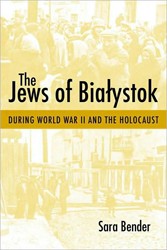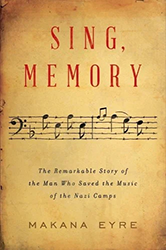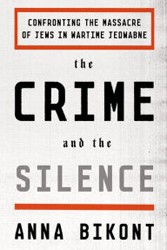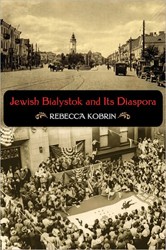By
– June 6, 2013
Kochanski, who is a Fellow of the Royal Historical Society and a member of the British Commission for Military History, deftly reconstructs wartime Poland, a nation caught between Nazi Germany and the Soviet Union between 1939 and 1945. Her chapters on the deportation of Poles to the Soviet Union as well as the murder of Polish army officers in the Katyn forest is riveting in its detail. Polish suffering under German occupation, the response of the Polish government in exile in London as well as detailed accounts of the Polish underground confronting the Nazis, provides in a single volume the most comprehensive account of this harrowing period of history.
But a history of wartime Poland would be incomplete without dealing with the Holocaust and the Polish response to the mass murder of Polish Jewry. Kochanski in a number of chapters addresses this subject. On the matter of Polish anti-Semitism, she recognizes that this has provoked intense and highly emotional arguments “which shows no sign of ending.” She acknowledges that anti-Semitism was widespread before the war, which led to an economic boycott of Jewish shops and a consensus among Polish political parties of encouraging Jewish emigration (to Madagascar). Kochanski also notes that during the German occupation of Poland there was no strong demonstration of opposition by the Poles to the persecution and subsequent deportation of the Jews. Yet despite the orders from the Polish government-in-Exile not to profit from the Jewish expropriation of property and shops, many Poles did just that. Kochanski attributes this indifference to the murder of Poland’s intellectual elite who were killed by the Germans thus creating a vacuum that might have provided leadership for the Polish people. Despite the prevalence of anti-Semitism in Poland, however, there is evidence that many Poles gave shelter to Jews, knowing that if they were caught it meant instant death. When it comes to the Polish Catholic Church, she finds a mixed reaction to the plight of the Jews. Some priests attempted to help Jews, others refused absolution to Poles who helped Jews in hiding.
There is much more of interest that Kochanski has to say about the Holocaust, including the role of Polish collaboration with the Nazis, but also that of Jewish collaborators. On this controversial subject, oft en omitted in works on the Holocaust, she writes, “it has been estimated that at the end of 1941 the Gestapo controlled 15,000 Jewish agents in the General Government,” including “The Jewish Militia” (Zydowska Gwardia Wolnosci), which assisted the Germans in finding Jews in hiding, and “The Society of Free Jews”(Towarzystwo Wolnych Zydow), which spied on the Jewish underground (ZOB). Kochanskii states that the Jews ran their own secret court in the Warsaw ghetto and sentenced fifty-nine collaborators to death. She notes that the Polish archives have an incomplete list of 1,378 Jewish collaborators and betrayers.
Kochanski has written an important, albeit, a controversial book on the subject of Poland in general and the annihilation of Polish Jewry in particular.
But a history of wartime Poland would be incomplete without dealing with the Holocaust and the Polish response to the mass murder of Polish Jewry. Kochanski in a number of chapters addresses this subject. On the matter of Polish anti-Semitism, she recognizes that this has provoked intense and highly emotional arguments “which shows no sign of ending.” She acknowledges that anti-Semitism was widespread before the war, which led to an economic boycott of Jewish shops and a consensus among Polish political parties of encouraging Jewish emigration (to Madagascar). Kochanski also notes that during the German occupation of Poland there was no strong demonstration of opposition by the Poles to the persecution and subsequent deportation of the Jews. Yet despite the orders from the Polish government-in-Exile not to profit from the Jewish expropriation of property and shops, many Poles did just that. Kochanski attributes this indifference to the murder of Poland’s intellectual elite who were killed by the Germans thus creating a vacuum that might have provided leadership for the Polish people. Despite the prevalence of anti-Semitism in Poland, however, there is evidence that many Poles gave shelter to Jews, knowing that if they were caught it meant instant death. When it comes to the Polish Catholic Church, she finds a mixed reaction to the plight of the Jews. Some priests attempted to help Jews, others refused absolution to Poles who helped Jews in hiding.
There is much more of interest that Kochanski has to say about the Holocaust, including the role of Polish collaboration with the Nazis, but also that of Jewish collaborators. On this controversial subject, oft en omitted in works on the Holocaust, she writes, “it has been estimated that at the end of 1941 the Gestapo controlled 15,000 Jewish agents in the General Government,” including “The Jewish Militia” (Zydowska Gwardia Wolnosci), which assisted the Germans in finding Jews in hiding, and “The Society of Free Jews”(Towarzystwo Wolnych Zydow), which spied on the Jewish underground (ZOB). Kochanskii states that the Jews ran their own secret court in the Warsaw ghetto and sentenced fifty-nine collaborators to death. She notes that the Polish archives have an incomplete list of 1,378 Jewish collaborators and betrayers.
Kochanski has written an important, albeit, a controversial book on the subject of Poland in general and the annihilation of Polish Jewry in particular.
Jack Fischel is professor emeritus of history at Millersville University, Millersville, PA and author of The Holocaust (Greenwood Press) and Historical Dictionary of the Holocaust (Rowman and Littlefield).





